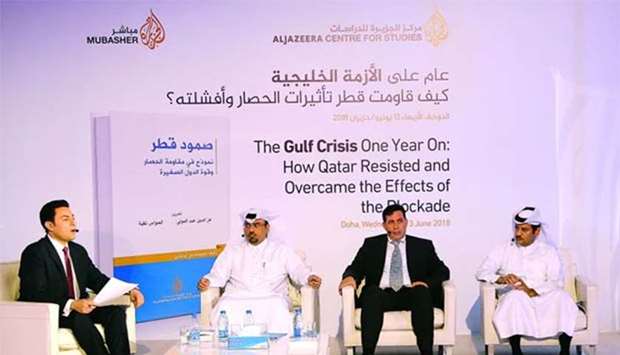The blockading countries are now under pressure and try to avoid talking about the Gulf crisis, contrary to the situation at the start of the crisis when they tried to tarnish the image of Qatar, a researcher has said.
"Qatar has managed to tell the truth to the world that it is the victim and the blockading countries want to undermine its sovereignty and independence," stated Al Jazeera Centre for Studies researcher Al Hawwass Taqiyah.
He was addressing a forum on the 'Gulf Crisis One Year on: How Qatar resisted and overcome the effects of the blockade,' hosted by Al Jazeera Centre for Studies and Al Jazeera Mubasher Channel on Wednesday night.
The event was part of marking the first year of the unjust blockade against Qatar by Saudi Arabia, the UAE, Bahrain and Egypt and explored the achievements of the country in turning the situation into a springboard for a more solid future.
A book titled "The Endurance of Qatar is a model of resisting the blockade and the power of small countries," was launched on the occasion. It is written by a group of researchers in the field.
The other speakers at the forum were Qatari mediaperson Abdulaziz al-Isshaq, Ankara-based political analyst Ali Hussein Bakir, and Qatari researcher Dr Khalid bin Rashid al-Khater.
"Qatar has managed to overcome the shock of the blockade and build a strong and enduring economy that further enhanced its stability and social peace," Dr al-Khater stated.
"The country has managed to build stronger and varied strategic economic partnerships with various international partners outside the region, diversified the economy and sources of income, and maintain solid infrastructure for both its local and international investments.
"Qatar's economy and its investment outlook is much better than what it was before the blockade. In addition, the country launched various initiatives to further free the economy and abolish any hurdles that could delay potential investments.
"All the attempts of the blockading countries to undermine the Qatari economy or damage its currency's value eventually failed due to the power of the national economy, its huge investments and fiscal reserve.
"Simultaneously the blockading countries lost their credibility internationally and locally because their media depended on false and fabricated news," Dr al-Khater added.
Al-Isshaq talked about the success of Qatar in building new strong alliances with various regional and international powers while the blockading countries failed to mobilise the world, especially some African and European countries, against Qatar. "The charges of terrorism against Qatar were not acceptable as the country's efforts in counter-terrorism and helping other countries overcome the consequences of terror are well-established globally."
Bakir stressed that the blockading countries are now in a dilemma as they cannot either escalate the situation or go back on their initial moves. "The endurance of Qatar has given the world a new model of how a small country can survive an unjust blockade," he added.
He was addressing a forum on the 'Gulf Crisis One Year on: How Qatar resisted and overcome the effects of the blockade,' hosted by Al Jazeera Centre for Studies and Al Jazeera Mubasher Channel on Wednesday night.
The event was part of marking the first year of the unjust blockade against Qatar by Saudi Arabia, the UAE, Bahrain and Egypt and explored the achievements of the country in turning the situation into a springboard for a more solid future.
A book titled "The Endurance of Qatar is a model of resisting the blockade and the power of small countries," was launched on the occasion. It is written by a group of researchers in the field.
The other speakers at the forum were Qatari mediaperson Abdulaziz al-Isshaq, Ankara-based political analyst Ali Hussein Bakir, and Qatari researcher Dr Khalid bin Rashid al-Khater.
"Qatar has managed to overcome the shock of the blockade and build a strong and enduring economy that further enhanced its stability and social peace," Dr al-Khater stated.
"The country has managed to build stronger and varied strategic economic partnerships with various international partners outside the region, diversified the economy and sources of income, and maintain solid infrastructure for both its local and international investments.
"Qatar's economy and its investment outlook is much better than what it was before the blockade. In addition, the country launched various initiatives to further free the economy and abolish any hurdles that could delay potential investments.
"All the attempts of the blockading countries to undermine the Qatari economy or damage its currency's value eventually failed due to the power of the national economy, its huge investments and fiscal reserve.
"Simultaneously the blockading countries lost their credibility internationally and locally because their media depended on false and fabricated news," Dr al-Khater added.
Al-Isshaq talked about the success of Qatar in building new strong alliances with various regional and international powers while the blockading countries failed to mobilise the world, especially some African and European countries, against Qatar. "The charges of terrorism against Qatar were not acceptable as the country's efforts in counter-terrorism and helping other countries overcome the consequences of terror are well-established globally."
Bakir stressed that the blockading countries are now in a dilemma as they cannot either escalate the situation or go back on their initial moves. "The endurance of Qatar has given the world a new model of how a small country can survive an unjust blockade," he added.

